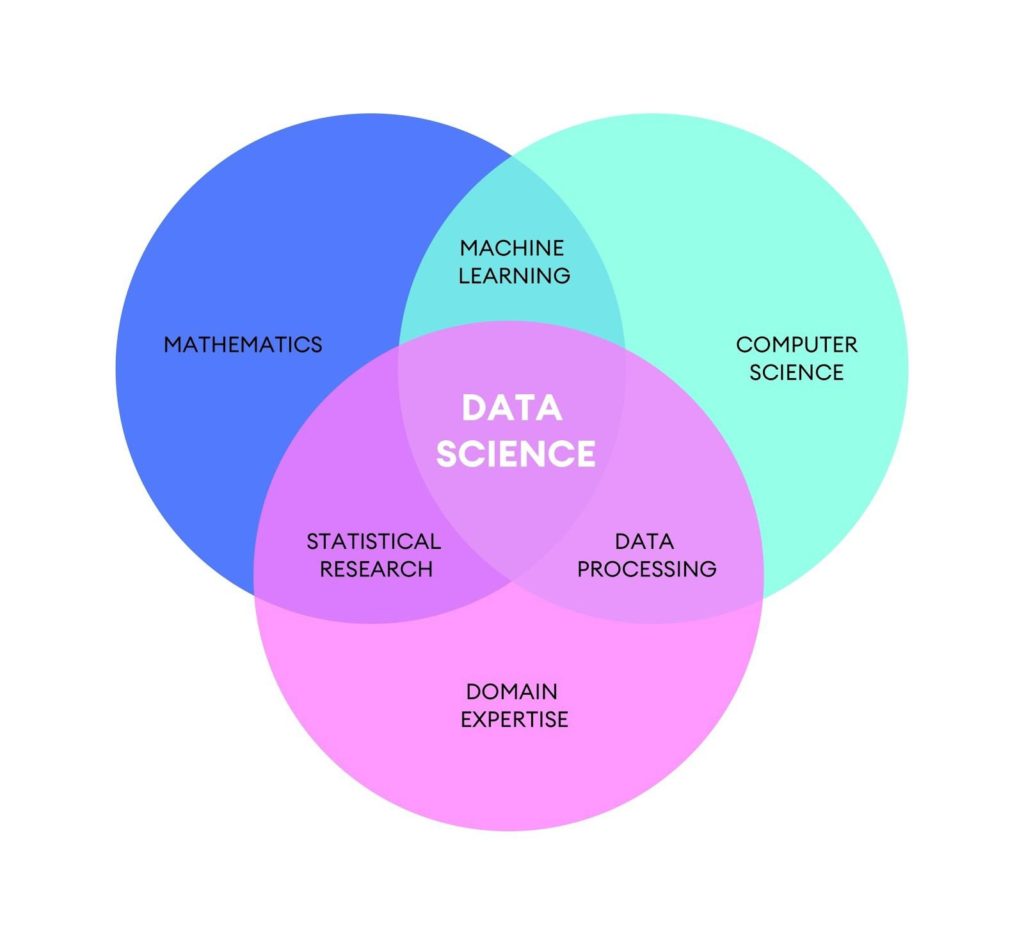How Data Science Helps Business – IT Company Experience. Data science applies various big data tools and machine learning (ML), which includes algorithms and methods of artificial intelligence (AI). The task of ML is to “teach” a program to take appropriate actions based on the huge amount of processed data.
Big data is the ways of collecting, storing, processing, and analyzing information. A collection of data is called a data set, and a specialist who works with it is a data scientist.
Today data science solutions such as services for recommendation and scoring or systems of intelligent apartment selection are popular in a great variety of business sectors: in banking, retail, tourist business, insurance, and many others.
Today data science solutions such as services for recommendation and scoring or systems of intelligent selection are popular in a great variety of business sectors: in banking, retail, tourist business, insurance, and many others. There are some well-known online projects of neural networks generating nonexistent human faces based on a huge number of real photos. Some neural networks also write coherent and meaningful texts.
How it Works
Data scientist (machine learning specialist) is dealing with the development of an algorithm that can model and predict user’s behavior, detect patterns and trends based on business data. Algorithm parameters are set automatically. The other words, an algorithm is a value calculation by a defined formula, such as y=5x+2. But the formula can not be known in advance and is produced by big data. As an example, using algorithm you can find out a person’s daily routine: productivity changes during the day and what do they depend on.
Data Also Includes Facts
The following example explains the core moments in working with data. Imagine we need to compile a work schedule for technical support operators. A call center is open 24 hours 7 days a week.
Call center receives more calls during the day than the night. Therefore, there should be less workers at the night shift. But this is not enough to build an accurate model. It is important to take into account the following information:
- an average number of incoming calls every day during a week, a month and a season. For example, during summer holidays the number will decrease;
- an information on calls distribution within 24 hours;
- number of employees, days off, public holidays and leave schedule;
- caller’s geolocation. It is essential to pay attention to time zones difference as when there is morning in European region, it is night in the USA;
- other information, such as call center specialists’ salary, lunch breaks, five-minutes breaks and so on.
An artificial intelligence algorithm will not only build the optimal work schedule for operators, but will also take into account all data changes and will constantly optimize it according to them.
Science is Data Analysis and Processing
Machine learning, statistics, optimization, and other areas of mathematics help Big Data professionals analyze the obtained data. These methods are used to analyze and process information, namely, to extract patterns, that are important for the project. So that they form the main data science component — data analysis. Patterns detection is needed for future predictions for new objects of research.
How Does it Assist Business?
The benefit of using data science in business is direct, both for a businessman and a client. A user constantly compares products and makes decisions, for example, choosing products in a supermarket or a movie in an online cinema. This process is known as “shadow work”. Algorithms can help a user to make a decision.
Netflix, YouTube, Amazon and other services are already using “smart” recommendation systems. Netflix is analyzing users behavior and suggests an individual content according to their past preferences. YouTube creates personalized recommendations for users based on views, likes, dislikes, and other options. Google shows targeted ads based on what sites has a user visited and what he or she has bought. Target, the American trading network, analyzes the history of purchases and changes in customers behavior, then sends them individual discount coupons, as if predicting their desires. In other words, there are plenty successful examples of artificial intelligence algorithms use in business.
Data Science and Myths
Machine learning certainly has a great future. New technologies are gradually being used in all areas of business, however, not all business owners trust them. Let us consider a few myths related to machine learning.
Myth #1. Computer Algorithms are Uncontrollable
“Artificial intelligence takeover” is really a persistent stereotype, and it is not easy to get rid of it. As AI is unpredictable, business owners are afraid that the automation of all operations through it can lead to the control loss.
In fact, the programs created by a human work only within the specified framework, and analytics specialists train them. Therefore, their behavior is predictable, and the final decision is always after a person.
Myth #2. Algorithms Capacity is not Suitable for Business Tasks
Anything new is often accepted through some time and overcoming. Frequently, business just does not believe in a capacity of machine approach. After all, if a whole analysts’ department processes one amount of data in two weeks, how can one algorithm do the same task in two hours? And definitely it can, so for now large retail companies have been using such technologies for a long time.
Myth #3. Big Data and Machine Approach are Expensive
Sometimes businessmen are frightened by the costs connected with machine learning, costs of attracting highly qualified experts, purchasing servers and other needs.
In fact, working with data will reduce other expenses, for example, on business analytics. In addition, a system works 24 hours a day and expenses can be paid off within approximately three or four months, depending on the features of the project.
Myth #4. Artificial Intelligence will Completely Replace Human Beings
Undoubtedly, there are some examples of 90% cut of technical support, accounting and human resources departments due to automation of the enterprise. However, there was no influence of artificial intelligence. Coachman and telephone operator positions disappeared at the time, and it happened only because of scientific and technical progress.
In fact, AI cannot do without people: it needs them to learn a new data. Eventually it is people who construct hypotheses and process the results of AI work. Some professions will disappear, but there will be new ones associating machine learning.
Myth #5. No Data for Processing
Specialists need data to design algorithms. A real problem occurs, if a business does not collect any information about customers. However, it can be solved by integration of a CRM system, especially if such company’s system has been working for at least from 2 to 3 years.
Big Data and Business
Business analytics is needed for decision-making support of large projects with complex structures. Such projects involve tens of thousands of employees or customers. However, the most common and easiest way to apply data science is to create personalized recommendations. This small step already leads to income growth, since:
- The consumer receives not a useless advertisement, but a really valuable information. It results in high motivation and increasing loyalty to a brand.
- A conversion grows.
- Businesses reduce costs and increase profits through more efficient warehouse management, balance monitoring, and accurate procurement planning.





